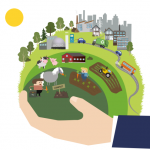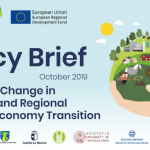BioSTEP Policy Paper – Creating Networks for the Transition to a Bio-based and Circular Economy
The bioeconomy holds potential solutions to important challenges of the future. The social, economic and environmental impacts associated with its products and processes, however, will require extensive dialogue processes on the future development of the bioeconomy.
BioSTEP aimed to promote a public dialogue on the goals of the Bioeconomy, to increase overall awareness and understanding, as well as consequences and benefits. It applied a three-tier approach to reach all relevant actors in the bioeconomy domain by using tailored communication tools, such as workshops, conferences, exhibitions and public debates on the bioeconomy.
The experience gained and lessons learned from BioSTEP are captured in a series of publications covering research recommendations, policy advice and practioners’ guidelines. Included is the policy paper Creating Networks for the Transition to a Bio-based and Circular Economy.


